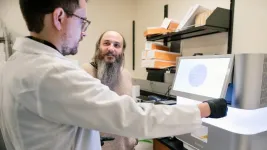(Press-News.org)
About half of adults with type 1 diabetes face significant cognitive impairment, including problems with working memory and executive function that affect day-to-day thinking. But less is known about how the condition affects children during a window of time known to be critical for healthy brain development.
A new large-scale longitudinal study, led by the Keck School of Medicine of USC, will unite 12 research centers across the United States to explore that important question. Researchers will collaborate to recruit a large, diverse group of children newly diagnosed with diabetes, taking a sweeping look at the environmental, lifestyle, social, and clinical factors that affect the way the brain develops. The five-year study is supported by a grant of more than $2.7 million from the National Institutes of Health.
“What we really want to know is: In children newly diagnosed with type 1 diabetes, what are factors that may either accelerate or mitigate the risk of developing brain-related complications?” said Kathleen Alanna Page, MD, an associate professor of medicine at the Keck School of Medicine and one of the project’s principal investigators.
With a target sample size of more than 1,000 children, the study is one of the first large-scale efforts to look at the neurocognitive effects of type 1 diabetes in this age group. The study is also unusual in its commitment to recruiting a racially, ethnically and income-diverse group of participants. Most past research on type 1 diabetes has looked primarily at white children.
“We want to translate these insights into real-world opportunities that can help the greatest number of children with diabetes,” Page said.
Ultimately, the findings could help refine clinical guidelines for managing type 1 diabetes, including what glucose levels are safest in terms of healthy brain development. The study could also aid in the creation of targeted treatments for the condition, including changes to sleep, diet, and physical activity that can help specific patients.
“All of that is going to be critically important in improving outcomes in children with diabetes and putting them on the trajectory for better health in the long term,” Page said.
Technological breakthroughs
Advanced tools, including insulin pumps and continuous glucose monitors, have revolutionized the way type 1 diabetes is monitored and treated. Page and her team will now leverage these devices to conduct research in a new way.
Continuous glucose monitors provide detailed reports on glucose levels in real time, including information about how glucose fluctuates throughout the day and the amount of time spent in “high-glucose” and “low-glucose” states.
“Comparing that data to information about brain health can help us refine our clinical guidelines and targets for how tight we want those glucose levels to be, and really help with the clinical management of type 1 diabetes,” Page said.
For example: Is it harmful to have multiple episodes of low glucose or high glucose, and how tight does the range of glucose levels need to be to keep the brain healthy? Do these factors differ between children and adults, or in type 1 versus type 2 diabetes?
The researchers will also use functional magnetic resonance imaging (fMRI) to look noninvasively at the structure, function and development of patients’ brains.
“We not only have more sophisticated ways of monitoring and treating type 1 diabetes, but we also have powerful ways to study the brain that we’ve never had before,” Page said.
A critical window
Studying the brain during childhood can offer valuable insights about long-term health. The brain develops rapidly during this timeframe and is particularly vulnerable to external harms, including changes in glucose that may influence how the brain functions.
To track and measure brain development, the researchers will collect data on academic performance, memory and attention, and neurobehavioral outcomes such as anxiety and behavioral health.
Researchers from each of the 10 study sites will soon convene to create a detailed study protocol, then begin recruiting participants. Page will lead the study from the Southern California hub, alongside co-principal investigators Jennifer Raymond, MD, an associate professor of pediatric endocrinology at Children’s Hospital Los Angeles, and Anny H. Xiang, PhD, director of the division of biostatistics research at Kaiser Permanente Southern California.
“This is somewhere that the Keck School can really shine, because we have all of the resources and the team to approach this question, as well as a diverse population that we serve,” Page said.
About this research
In addition to USC, the consortiums’ other study sites are the University of Minnesota; Washington University in St. Louis; the University of North Carolina at Chapel Hill; Indiana University-Purdue University Indianapolis; the University of Florida; New York University School of Medicine; the University of California, Davis; Vanderbilt University Medical Center; Joslin Diabetes Center; Nemours Children’s Clinic; and the University of Colorado Denver.
This work is supported by the National Institutes of Health [1U01DK140786].
END
A landmark study has uncovered novel ancestry-specific genetic variants linked to multiple sclerosis (MS), offering new insights that could reshape treatment approaches for diverse populations affected by the disease.1 The research, presented today at ECTRIMS 2024, is the result of efforts by the Alliance for Research in Hispanic MS (ARHMS) Consortium and is the first large-scale study to identify ancestry-specific genetic effects for MS risk.
In a comprehensive analysis of over 7,000 individuals from self-reported Hispanic (n=4,313; 2,201 MS, 2,112 controls) and African American (n=3,085; 1,584 MS, 1,501 controls) backgrounds, researchers discovered ...
New research presented today at ECTRIMS 2024 reveals that initiating monoclonal antibody therapy during childhood, rather than delaying treatment until early adulthood, significantly reduces long-term disability in multiple sclerosis (MS) patients.1
The study, which utilised data from the French MS Registry, Italian MS Register, and the global MSBase Registry, analysed the outcomes of 282 patients with paediatric-onset MS who began experiencing symptoms before the age of 18 years. Patients were divided into two groups based on when they initiated monoclonal antibody treatment: either ...
Dr. Ali Khademhosseini, Ph.D., CEO and Director of the Terasaki Institute for Biomedical Innovation (TIBI), is honored with the 2024 Andreas Acrivos Award for Professional Progress in Chemical Engineering by the American Institute of Chemical Engineers (AIChE). This distinguished honor recognizes outstanding progress in the field of chemical engineering.
Named after Dr. Andreas Acrivos, Albert Einstein Professor of Science and Engineering, emeritus at the City College of New York, whose pioneering work in fluid ...
American Geophysical Union
17 September 2024
AGU Release 24-33
For Immediate Release
This press release is available online at: https://news.agu.org/press-release/slow-landslides-growing-threat-mountain-communities/
Slow-moving landslides a growing, but ignored, threat to mountain communities
Urban growth, climate change, and flood risk at lower elevations can push people to live on steeper, more dangerous terrain
AGU press contact:
Rebecca Dzombak, news@agu.org (UTC-4 hours)
Potsdam press contact:
Stefanie Mikulla, University of Potsdam, presse@uni-potsdam.de (UTC+2 hours)
Researcher contact:
Joaquin Vicente Ferrer, ...
Browser extensions, the software add-ons that help users customize and enhance their web browsers, are wildly popular. Some of the most-used extensions find shopping deals, fix grammar and typos, manage passwords, or translate web pages. The types of extensions available are nearly endless, and many have become indispensable tools for businesses and everyday users.
While these extensions can make web browsing more accessible, productive, and rewarding, they are not without risk. New research from Georgia Tech reveals that thousands of browser extensions pose significant threats to privacy, and hundreds automatically ...
SAN FRANCISCO—Within bacterial cells, specialized immune systems known as retrons fend off viral attacks. But that’s not all they can do.
Scientists, including Seth Shipman, PhD, at Gladstone Institutes, have shown that retrons also serve an important purpose in the lab: precise DNA editing. In fact, retrons can be combined with CRISPR—the far more famous bacterial-defense-system-turned-gene-editor—to better edit human cells.
Yet, for all their potential to help scientists better understand disease and develop new therapies, only a small number of retrons have been studied. In nature, many thousands of variations exist, some with greater gene-editing powers than ...
First-of-its-kind research by Tarang Parekh, assistant professor of epidemiology, reviewed the State Innovation Models (SIM), a payment system introduced by the Centers for Medicare and Medicaid Services in 2013, which provides financial incentives to states to develop innovative payment models to improve healthcare systems.
In the study, recently published in the American Journal of Epidemiology, Parekh compared data from 2010 to 2015 from three SIM participating states, Arkansas, Massachusetts and Vermont, to Florida, Nebraska and New Mexico, which do not participate in ...
BUFFALO, N.Y. – Colorectal cancer (CRC) is no laughing matter. It’s the second-leading cause of cancer deaths globally, according to the World Health Organization. But new research led by the University at Buffalo suggests that humor can be an effective mechanism for reaching people who otherwise avoid information about colorectal cancer screening or other health messaging.
The research, published online ahead of print in the British Journal of Health Psychology, found that in people who demonstrated a ...
UNIVERSITY PARK, Pa. — A novel neurotechnology treatment known as deep brain stimulation (DBS) can benefit patients with neurological disorders, but it involves surgical procedures with potential risks. Assessing the risk-benefit tradeoffs and the ethics in making decisions about whether to begin such treatments and when can be tricky for both patients and clinicians.
Laura Cabrera, associate professor of engineering science and mechanics, received a four-year, $1.5 million grant from the National Institutes of Health to research and develop ...
A discovery six years ago took the condensed-matter physics world by storm: Ultra-thin carbon stacked in two slightly askew layers became a superconductor, and changing the twist angle between layers could toggle their electrical properties. The landmark 2018 paper describing “magic-angle graphene superlattices” launched a new field called “twistronics,” and the first author was then-MIT graduate student and recent Harvard Junior Fellow Yuan Cao.
Together with Harvard physicists Amir ...




